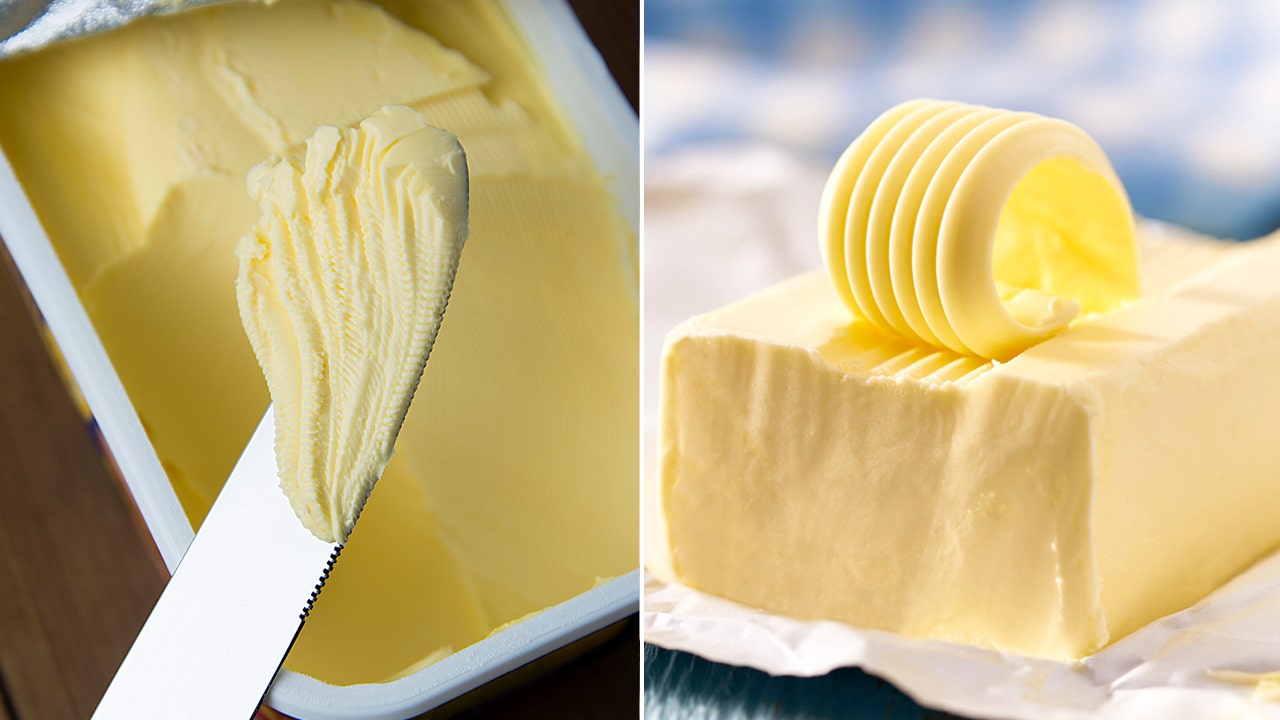Is butter better — or is margarine what you should choose for your health?
“I think most people assumethat margarine or butter replacements are a better choicefor health because they’re lower in saturated fat, whichisn’t necessarily true,” Jillian Kubala, a New York-based registered dietitian, told Fox News Digital.
“Fats are often misunderstood and oversimplified, even by health professionals, which has led to a general demonization and fear of fats,” she also said.
COFFEE VS. TEA: WHICH DRINK IS ‘BETTER’ FOR YOU?
“The truth is that fats are highly complex, and their physiological effects depend on their composition, source and more.”
Butter is a dairy product, while margarine is typically made from vegetable oils and water, often with added emulsifiers and flavorings.
Do you prefer butter or margarine? Here is everything you need to know about the spreads and their health situations. (iStock)
Before you slather a spread on your toast or slip some into the skillet, take a look at some of the health specs of butter versus margarine.
What are the health stats of butter?
Kubala pointed out the nutrition information on butter using the USDA Food DataCentral Database.
Butter is known for its rich and creamy taste. One tablespoon of butter contains 7.3 grams of saturated fat. (iStock)
As she broke it down, a typical serving size of butter is one tablespoon, which provides the following:
Calories: 102
Total fat: 11.5g
Saturated fat: 7.3g
“If you’re replacing butter with a more nutritious (nutrient-density and antioxidant-wise) option like avocado or olive oil, it might positively influence your health. However, if you’re swapping butter for a highly processed product, like margarine, it might have the opposite effect,” said a nutritionist. (iStock)
What are the health stats of margarine?
Per Kubala, the nutrition specs of margarine for a serving size of one tablespoon are generally as follows:
Calories: 84.8
Total fat: 9.56g
Saturated fat: 2.34g
Margarine’s nutritional facts can vary between the brand and type chosen by the consumer. (iStock)
While margarine is lower in total fat and in saturated fat than butter, not all foods that are lower in fat are necessarily “better” for you, said Kubala.
Margarine, for example, can be made with oils that are high in omega-6 fats, she said.
REGULAR SUGAR VS. ARTIFICIAL SWEETENER: IS ONE WORSE FOR YOU THAN ANOTHER? EXPERTS CHIME IN
“While both omega-3 and omega-6 fats are necessary for health, most Americansconsume diets much higher in omega-6s,” Kubala said, pointing to a 2021 study published by The Journal of the Missouri State Medical Association.
“[Omega-6s] are concentrated in vegetable oils, [rather] than omega-3s, which are concentrated in seafood and certain plant foods, like chia seeds,” she said.
“This leads to an imbalance favoring omega-6s, which tend to be more inflammatory in nature, over omega-3s, which are anti-inflammatory.”
She continued, “Health experts suggest that this dietary imbalanceis a main driver behind many chronicinflammatory conditions, including metabolic syndrome, obesity, increased heart disease risk factors, certain cancers and cognitive decline.”
What about vegan or ‘plant-based’ butter-like spreads?
In recent years, plant-based “butters” have become increasingly popular. Plant-based “butters” are typically made from various vegetable oils such as coconut, soy or avocado.
To make them taste more like butter and have the right texture, emulsifiers and flavorings are often added.
Several vegan or plant-based butters use avocado oil as a base before adding flavorings that create a more “butter-like” taste. (iStock)
“Some plant-based spreads are made with minimal, nutritious ingredients such as nuts or nut milk but most butter alternatives are generally highly processed and made with omega-6-rich oils,” Kubala said.
Kubala said that if you’re looking to consume a spread with a butter-like texture or a butter replacement to use while you cook or bake, then choosing a plant-based product is “perfectly fine.”
BROWN RICE VS. WHITE RICE: NUTRITIONISTS SETTLE THE GREAT FOOD DEBATE
“While consuming small amounts of butter replacements won’t significantly impact health, I always recommend opting for minimally processed foods whenever possible,” she said.
“For example, if you’re unable to consume butter due to dietaryrestrictions, try using mashed avocado or a drizzle of high-qualityolive oil in place of butterontoast.”
Emulsifiers are often added to vegan butters, some made with coconut oil, to create a texture that closely resembles butter. (iStock)
One study published in 2022 in the Journal of the American College of Cardiology found that people who consume more than half a tablespoon (7 grams) of olive oil per day have been found to have a lower risk of dying from cardiovascular disease, cancer, neurodegenerative disease and respiratory disease.
Researchers also found that people live longer when they replace 10 grams per day of margarine, butter, mayonnaise and dairy fat, with olive oil, Fox News Digital previously reported.
Bottom line in the butter vs. margarine debate
There are different types ofsaturated fats (small, medium and long-chainsaturated fats), “which havecomplex and varying effects on heart disease risk factors,” said Kubala.
WHITE POTATOES VS. SWEET POTATOES: NUTRITION AND HEALTH EXPERTS CHIME IN ON WHICH IS BETTER
Still, she added, health organizations have long recommended that people reduce saturated fat intake to improve heart health.
“While it’s important to avoid certain high-fat foods, such as fried foods, this general recommendation to cut back on foods high in saturated fat, like butter, and replace them with low-fat alternatives, like margarine, hasn’t done much for public health,” Kubala said.
WHITE BREAD VS. WHOLE WHEAT BREAD: IS ONE ‘BETTER’ FOR YOU?
She added, “Rates of chronic health conditions like type 2 diabetes and obesitysteadily climbedover time as Americans became more dependent on low-fat foods, like sugary carbohydrates, low-fat salad dressings and butter replacements.”
A natural product, butter is high in saturated fats. By comparison, margarine is lower in saturated fats, but could contain trans fats — and both fats can negatively impact heart health. (iStock)
“Thinking of all saturated fats as ‘bad’ and unsaturated fats as ‘good’ or ‘healthy’ isn’t the way to view macronutrients,” she said.
“While it’s true that consuming a diet very high in saturated fats, like butter, may negatively impact health in some ways, especiallyin people who are more sensitive to dietaryfats or have healthconditions that requirelower-fat diets, most people don’t need to avoid high saturated fat foods completely.
CLICK HERE TO SIGN UP FOR OUR LIFESTYLE NEWSLETTER
“Butter isn’t inherently harmful and can be incorporated into most healthy, well-rounded dietary patterns.”
People should look at their overall diet and food consumption rather than “focusing on or fearing one nutrient.” (iStock)
Kubala suggested that people look at their overall dietary intake and quality of diet.
“If your diet is very high in high-fat foods known to negatively impact health, such as fried food and processed meats, cut back on those foods and replace them with fat-rich foods known to positively impact health, such as fatty fish, avocado, nuts and seeds,” she said.
And if you like butter, Kubala added, “then enjoy it in small portions.”
“In my opinion, eating small amounts of butter is a better choice for overall health than consuming highly processed butter replacements, like margarine,” she said.


